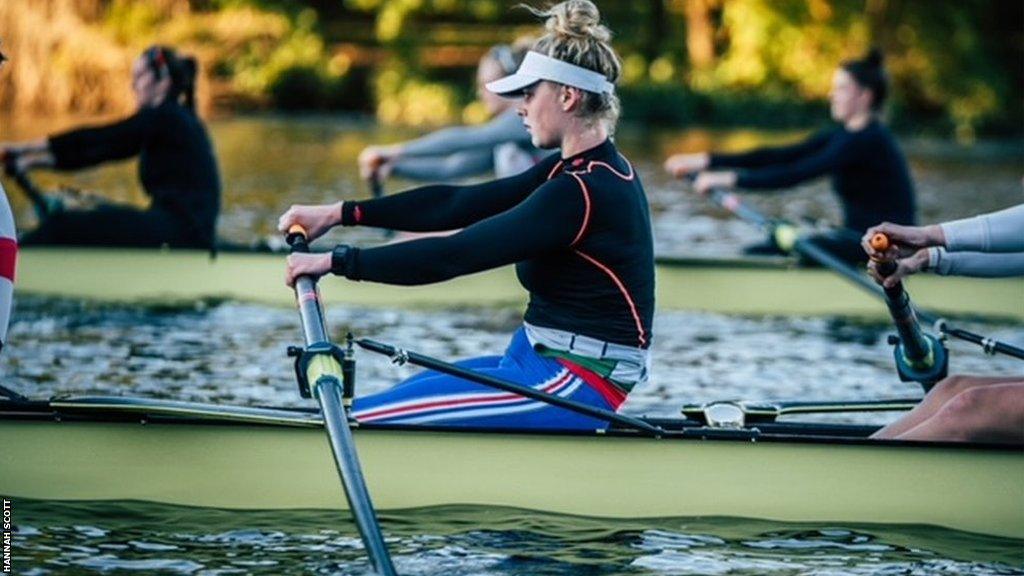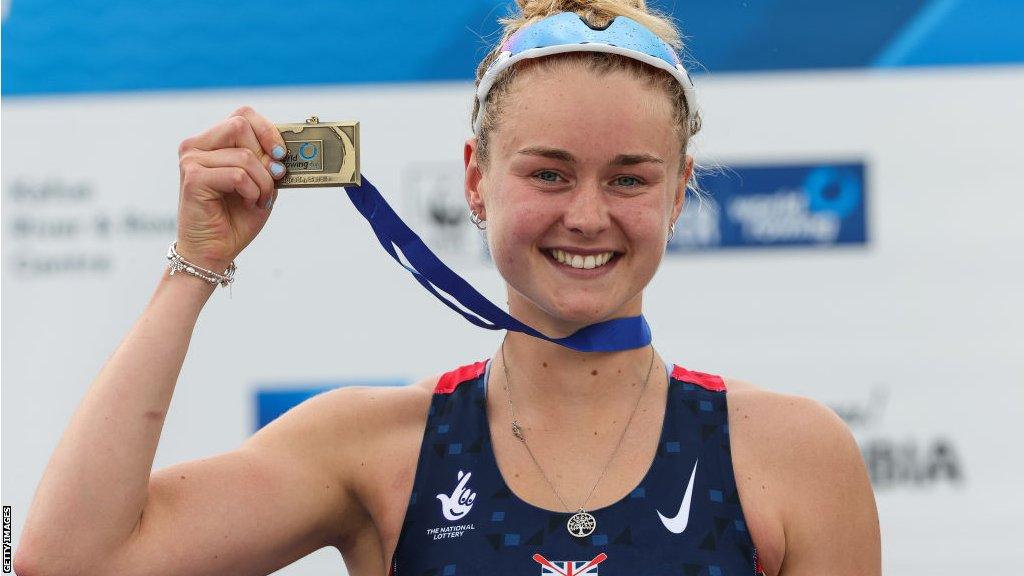Hannah Scott: Rower on breaking her ribs and finding a cure
- Published
Hannah Scott: Rower on breaking her ribs and finding a cure
Hannah Scott has broken so many ribs in her career, she's lost count.
But the 24-year-old from Coleraine, Northern Ireland, doesn't play a high-impact or combat sport. She is an Olympic rower.
"It was something I just accepted and thought was normal," Scott tells BBC Sport. "It's a constant level of pain that kind of becomes normalised because when you're breathing, your ribs are constantly moving.
"Daily activities like laughing, coughing, driving, sleeping become extremely hard. You can't put a cast on your ribs, you just have to work through it."
Rib injuries, including muscular pain, stress fractures and bone breaks, can be common for women in elite rowing, but not always at the rate Scott was suffering.
She sustained her first rib injury aged 18 while studying at Princeton University in the United States and has had at least two injuries every year since, forcing her out of full training for weeks at a time.
But things came to a head last summer when she sustained her most serious injury yet while racing at Henley Royal Regatta, snapping her rib in two.
"My rib was broken in half six weeks before the World Cup and European Championships. It's demoralising because you've just spent a full year training and then half of your racing season is just gone. That was the final line of 'we need to fix this'."
After weeks of tests, Scott was sent for a bone scan and diagnosed with osteopenia, a bone-weakening condition commonly found in older women, prompting her to consider retirement at the age of just 23.
"I just thought, 'I can't keep doing this to my body'," Scott recalls.
"I had lost belief. I was tearing my hair out. British Rowing really picked me up off the ground and said 'we're going to make sure this doesn't happen to you again'."
Search for answers

Scott says she has come to realise the importance of fuelling properly in order to maintain peak fitness
Scott's search for answers led her to take part in a new British Rowing research project.
Project Minerva - named after the Roman goddess for war and wisdom - brings together elite athletes, university researchers and sports scientists under the same roof, in a world first scheme.
Proposed and led by British Rowing, with support from the UK Sports Institute and researchers from Manchester Metropolitan University, the goal is to improve support and understanding of the health and performance of female rowers.
Using saliva testing to track hormones and the menstrual cycle alongside other training markers such as heart rate monitors to measure exertion, training is now more personalised and productive, helping to produce athletes who are healthier and stronger.
Since taking part, Scott has discovered her susceptibility to rib injuries was connected to hormone levels, under-fuelling and Red-S (relative energy deficiency in sport).
She said: "Fuelling for women is so important because it gives us the energy to train every day while also being able to help our bodies to function. I don't think as women we've always had the stance of fuelling our bodies for those purposes, there's definitely a stance in society that we have to look a certain way.
"But with this project, we've realised the importance of eating, looking after yourself, recovery and making our body strong for performance, not just to look at."

Scott was in the medals at the 2022 Rowing World Cup and then claimed gold in the quadruple sculls at the World Championships in Belgrade in September 2023
Scott, who made her Olympic debut at the Tokyo Games in 2021, has now been injury-free for the past 12 months and found out last month her osteopenia has been reversed.
She marked her competitive comeback with a gold medal in the quadruple sculls at the World Championships in Belgrade in September and says the learnings from Project Minerva gave her a new-found confidence on the start line.
"I knew so much more about my body," she said. "I knew that my body was strong. A year before I was sitting in a position where I kept snapping my bones in half. It's given me power and control back in my own body."
Project Minerva started a year ago with just eight volunteers. Now, all but a handful of the squad are taking part. The hope is what's happening at the GB rowing base in Caversham will become a blueprint for other Olympic and Paralympic sports in the future.
Serious investment in female athlete health looks set to continue, with the UK Sports Institute recently launching a dedicated Centre of Excellence for Women in Sport at Manchester Metropolitan University to produce research and data that can be used to support both elite athletes and female exercisers in the general public.
Dr Rich Burden, the UK Sports Institute's co-lead for female athlete health and performance, told BBC Sport: "Our intent has always been to be on the front foot.
"We want to be the ones who are giving our athletes the right support and information and to do that, sometimes you do have to push the boundaries and tread into the unknown.
"To bring academic and elite sport together in one place, working together to improve the support of female athletes across sports science disciplines, that's something we're really proud of."
Scott shares that pride, determined to help the next generation of female athletes.
"I've learned through this project the capabilities of women's bodies to be stronger in certain ways," she said. "It's not that we're weak, we just didn't have the support in the first place to be strong.
"I want to share my learnings with other women who are going through similar experiences with their bodies and training and managing hormones. We're just starting to realise how important they are and when this project came along, I felt I had a duty to younger girls and women going into the sport in the future."